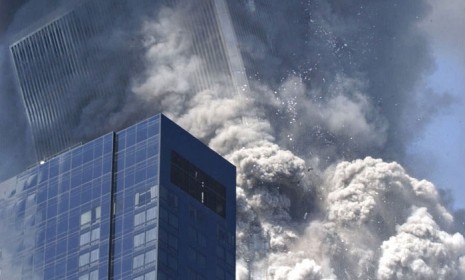When it's okay to believe in 9/11 conspiracy theories


Col. Miles Kara (Ret.), a highly credentialed member of the congressional joint commission that investigated the 9/11 attacks, is one of the most dogged and least ideological of those who believe that the ground truth of what happened that day has not been fully and faithfully disclosed to the public. In that sense, Kara wants the truth. But he is not a 9/11 Truther; he is not, so far as I can tell, an adherent to the discredited theories about who planned the attack, who carried it out, whether the U.S. government "allowed" the attacks to happen deliberately, or whether the attacks were a deliberate "false flag" operation to shock the world out of its post Cold War reverie.
What he does believe is, frankly, what the 9/11 Commission's report concluded: that the government's response to the events of 9/11, to the intelligence they received beforehand, and to the questions they received after, were deeply flawed. Kara believes that if the government had organized its response around two centers of gravity — the NMCC in the Pentagon and the FAA's Command Center — and had feedback loops been in place and rehearsed to allow for inevitable mistakes to be caught and quickly corrected, much of the chaos that delayed critical decisions could have been reduced. In his own words:
"The nation's response was supposed to organize around set structures, two in particular. First, both the FAA and NMCC had procedures in place to 'manage' events that perturbed the equilibrium. Neither was effective, neither could talk to the other; they might as well have been on different planets.
Second, at the national level, things were supposed to organize around the White House Situation Room. The Secret Service removal of the vice president to the surreal world of the PEOC virtually ensured that he would be out of touch and filtered from reality, not that the Situation Room was a much better place to be, information-wise. However, there at least the vice president could have heard, perhaps seen, the Langley fighters overhead at 10:00, as captured on video in real time by a CNN camera crew.
Concerning both the PEOC and the Situation Room, I can't help but recall George Plimpton's classic description of a golf swing. Time.com has it this way: "His mind invents a nightmarish fantasy in which a team of inept Japanese admirals, located somewhere in his brain, shout useless instructions through the imaginary voice tubes of his creaking body machinery in an effort to help him hit the ball correctly."
This, I agree with. Almost entirely.
The Week
Escape your echo chamber. Get the facts behind the news, plus analysis from multiple perspectives.

Sign up for The Week's Free Newsletters
From our morning news briefing to a weekly Good News Newsletter, get the best of The Week delivered directly to your inbox.
From our morning news briefing to a weekly Good News Newsletter, get the best of The Week delivered directly to your inbox.
A free daily email with the biggest news stories of the day – and the best features from TheWeek.com
Marc Ambinder is TheWeek.com's editor-at-large. He is the author, with D.B. Grady, of The Command and Deep State: Inside the Government Secrecy Industry. Marc is also a contributing editor for The Atlantic and GQ. Formerly, he served as White House correspondent for National Journal, chief political consultant for CBS News, and politics editor at The Atlantic. Marc is a 2001 graduate of Harvard. He is married to Michael Park, a corporate strategy consultant, and lives in Los Angeles.
-
 Europe’s apples are peppered with toxic pesticides
Europe’s apples are peppered with toxic pesticidesUnder the Radar Campaign groups say existing EU regulations don’t account for risk of ‘cocktail effect’
-
 Political cartoons for February 1
Political cartoons for February 1Cartoons Sunday's political cartoons include Tom Homan's offer, the Fox News filter, and more
-
 Will SpaceX, OpenAI and Anthropic make 2026 the year of mega tech listings?
Will SpaceX, OpenAI and Anthropic make 2026 the year of mega tech listings?In Depth SpaceX float may come as soon as this year, and would be the largest IPO in history
-
 Why Puerto Rico is starving
Why Puerto Rico is starvingThe Explainer Thanks to poor policy design, congressional dithering, and a hostile White House, hundreds of thousands of the most vulnerable Puerto Ricans are about to go hungry
-
 Why on Earth does the Olympics still refer to hundreds of athletes as 'ladies'?
Why on Earth does the Olympics still refer to hundreds of athletes as 'ladies'?The Explainer Stop it. Just stop.
-
 How to ride out the apocalypse in a big city
How to ride out the apocalypse in a big cityThe Explainer So you live in a city and don't want to die a fiery death ...
-
 Puerto Rico, lost in limbo
Puerto Rico, lost in limboThe Explainer Puerto Ricans are Americans, but have a vague legal status that will impair the island's recovery
-
 American barbarism
American barbarismThe Explainer What the Las Vegas massacre reveals about the veneer of our civilization
-
 Welfare's customer service problem
Welfare's customer service problemThe Explainer Its intentionally mean bureaucracy is crushing poor Americans
-
 Nothing about 'blood and soil' is American
Nothing about 'blood and soil' is AmericanThe Explainer Here's what the vile neo-Nazi slogan really means
-
 Don't let cell phones ruin America's national parks
Don't let cell phones ruin America's national parksThe Explainer As John Muir wrote, "Only by going alone in silence ... can one truly get into the heart of the wilderness"
